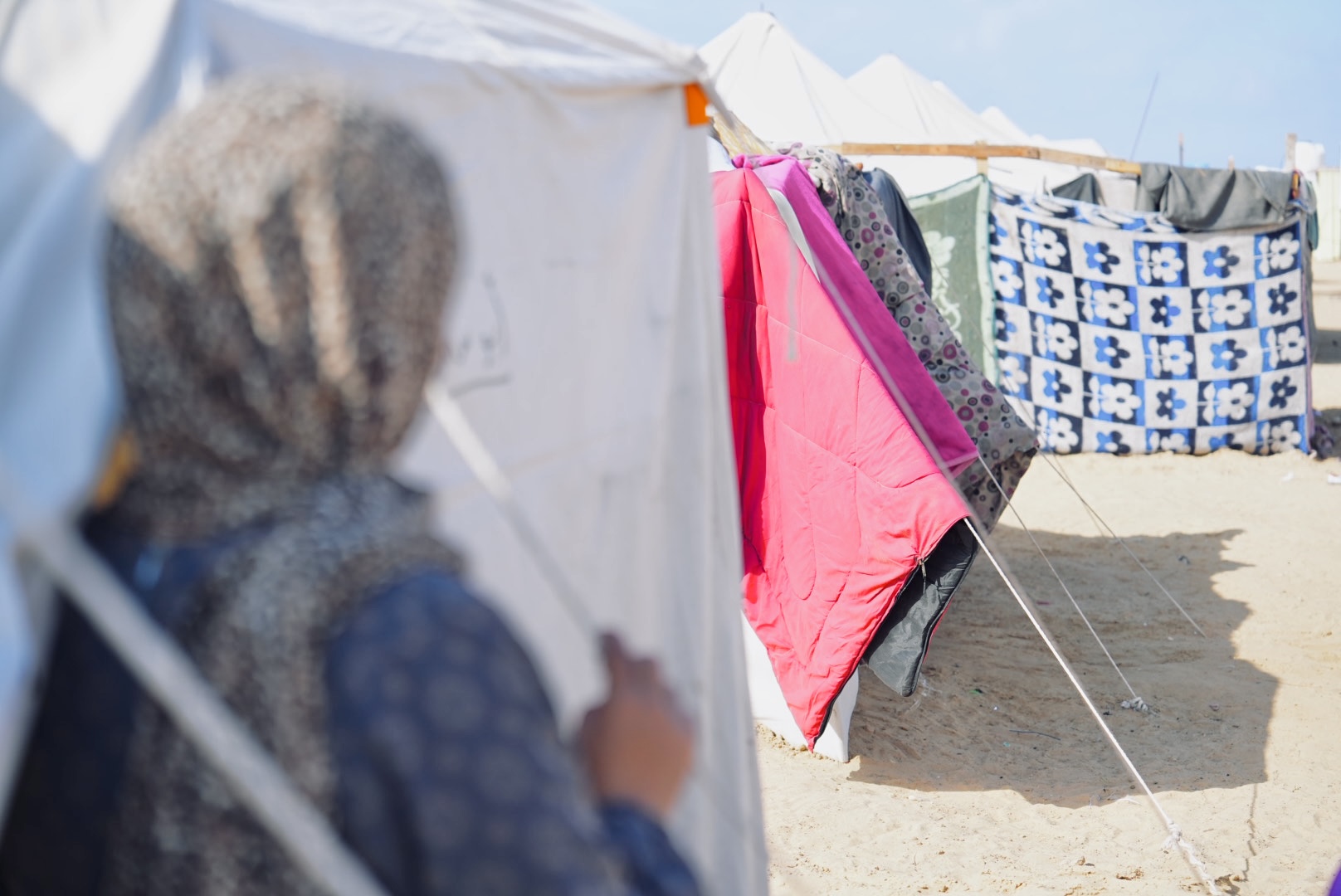
Folla Hamed Mousa Hamam (40), a widow and a mother of three children.
My name is Folla, mother to three children: Raneen (19); Haitham (17); and Saleh (15). Words will never be enough to capture the agony that tore through my heart as I watched our lives spiral into an endless daily struggle. The tragedy began in February 2024 when flour became scarce. We resorted to grinding wheat and eating its tasteless bread just to stave off hunger. But even the wheat ran out. Desperation pushed us to grind barley and later corn, whose bitter taste was nearly unbearable. I watched my children turn away from the food in pain, yet hunger overpowered their reluctance.
When rice became our only option, its price had soared to 200 shekels per kilogram. We managed to buy it three times before my husband could no longer afford it. We had only a single meal a day, as we went to bed hungry. I couldn’t bear to look into my children’s hollow eyes—eyes that silently narrated stories of hunger and deprivation. My husband and I would starve to feed them, yet even that was insufficient. Their complexion turned pale like the dead, their faces yellowed, and their frail bodies withered before my eyes.
With the water stations and plants shut down, we were forced to drink salty water. I saw its toll on their health, and the helplessness was unbearable. It felt as though I was dying twice each day: once when I saw my children starving with nothing to offer them, and again when I heard their desperate pleas for food and water, unable to answer. What kind of a mother could endure such torment? Hunger gnawed at our souls even before it consumed our bodies. Our existence had become a nightmare I couldn’t awaken from. As the situation worsened, my husband decided to flee to the southern Gaza Strip, where it was said the conditions were less severe and survival more likely. Fear and anxiety overwhelmed me—I fought against the decision with all my strength. How could I leave a place we knew, even in hunger, for an unknown path filled with danger? But my husband’s and children’s determination defeated me.
On 22 February 2024, I gathered our remaining belongings, and we left Gaza Girls’ School at 09:00. Ten families accompanied us, and we were the last donkey cart in the convoy. At one point, we had to dismount and continue on foot. The road was rough and exhausting, the burdens heavy, and hope scarce. My husband and sons walked ahead of me while I stayed back with my daughter, Raneen, holding onto the sight of them in front of me as my last tether to safety. Then, at 10:00, a deafening explosion shattered the air, as if the world itself had come to an end. Smoke engulfed the area, and it felt like the sky had fallen to the ground. I lost all sense of time and place; screams and sobbing mixed with the sound of my heart breaking. The searing heat of shrapnel pierced my body. Desperately, I shouted my husband’s and children’s names into chaos, but there was no reply. Through the haze, I saw my husband, Mo’een, collapse to the ground, blood coming out from his head. I couldn’t reach him.
Minutes passed in a haze of confusion and helplessness before I found my daughter, Raneen. Her face was distorted by fear and streaked with tears, but my sons, Haitham and Saleh, had vanished into the darkness of smoke and death. My screams echoed back at me unanswered, and my heart felt as though it might stop. Those around us warned that death still lingered and urged us to leave immediately. Summoning the remnants of my strength, I clutched Raneen’s trembling hand, and we began the harrowing journey back north on foot.
The road was another nightmare—shards of glass pierced our feet, and the heavy sand made each step feel like it might be our last. We arrived at Gaza Girls’ School at 19:00, utterly exhausted, our bodies and souls broken.
That night, I sobbed nonstop. My body was drained, but my mind screamed with a thousand questions about the fate of Mo’een, Haitham, and Saleh. By morning, the Red Cross arrived with the news that shattered me entirely: my husband, Mo’een, had succumbed to his head injury and passed away. My son Haitham, the light of my life, had lost his eyes, leaving me in perpetual darkness. My youngest, Saleh, was struck in the neck, and he, too, was gone. They were all taken by hunger and suffering long before death claimed them. Now, I live carrying the unbearable weight of their loss and the memory of their hunger. Raneen and I reside in a tattered tent that floods with rainwater every time it pours. For the past three days, we’ve been sleeping on the ground because our bedding is soaked. We have nothing to eat and no source of income, relying only on sporadic aid—if the Israeli forces permit it to enter. Each moment, I long for the ability to provide a healthy meal for Raneen, the only part of my world that survived, but even this small wish feels like a distant dream.
I’m so sorry you’re experiencing this kind of pain. Losing loved ones—especially under such devastating circumstances as hunger—is an unimaginable tragedy, and no one should have to endure that.